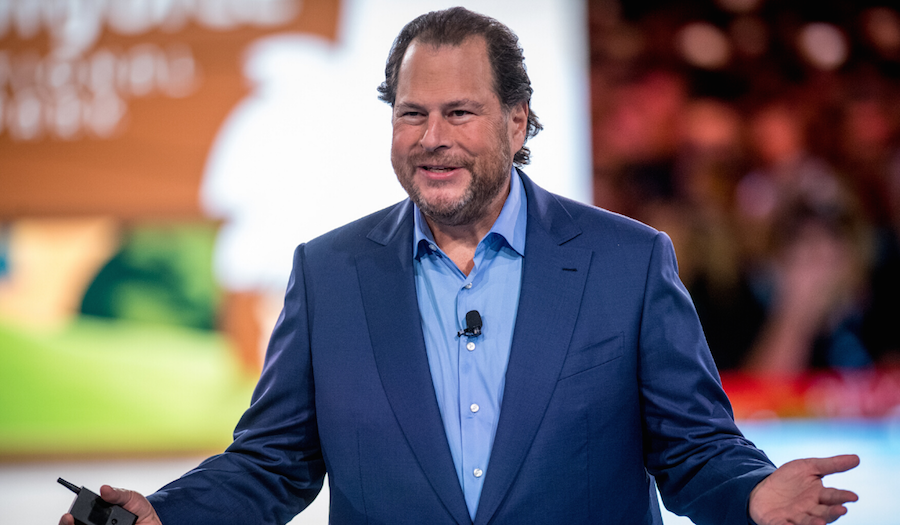Salesforce Co-CEO Marc Benioff on Why Changing the World is Everyone’s Business

Salesforce Chairman and co-CEO Marc Benioff says that business has the power to be a platform for change and social good; that none of us in the business world can afford to sit on the sidelines and ignore what’s going on outside the walls of our workplaces.
In his latest book “Traliblazer,” Benioff reveals how Salesforce’s core values—trust, customer success, innovation, and equality—and commitment to giving back have become the company’s greatest competitive advantage and the most powerful engine of its success.
1. The description on the book flap starts with the question: What’s the secret to business growth and innovation and a purpose-driven career in a world that is becoming vastly more complicated? How does the success behind Salesforce provide an answer to this question?
The most powerful engine of Salesforce’s success hasn’t been our software, our people, or our business model, but rather, the decision we made in 1999 to orient our culture around values.
In business you have to realize, of course, you have shareholders. That’s one of the core premises. And we have an incredible shareholder return. If you had bought Salesforce stock in 2004 when we went public, you would have a 3,500 percent return.
But we also value our stakeholders — employees, customers, partners, homeless, public schools, and the planet. That’s why we’ve given $310M in grants to worthy causes, our employees have volunteered more than 4.5M hours and 45K non-profits and NGOs use $1B of our software for free each year.
2. What are the core values that your company offers that most do not?
When we signed the Salesforce incorporation papers in 1999, we wanted to make sure the notion of giving back was deeply ingrained in the fabric of our company. Of course, I hoped Salesforce would prosper by traditional measures, but I was equally determined that it would have a positive impact on the world. So, from the outset, we decided to identify the values that would serve as our bedrock.
At first, they were trust, customer success, and innovation; later, we added a fourth, equality. My experiences have taught me that the tough times are when values and culture matter most. The paths we’ve chosen at Salesforce have been the ones that best upheld our collective values. Not just sometimes, but always.
A few short years ago, I believed the chief reason Salesforce’s market valuation had risen from $1 billion to more than $120 billion since we went public in 2004 was that we had done a commendable job of running the business. But I now know the most powerful engine of our success hasn’t been our software, our people, or our business model, but rather, the decision we made in 1999 to orient our culture around values.
3. What is the 1-1-1 model?
When we started Salesforce, we set aside 1 percent of our equity, product, and employee time for charitable causes—an initiative we call the 1-1-1 philanthropic model.
Since day one, every single employee we have hired receives 7 paid days off to volunteer wherever they choose—and we match their donations to whatever cause is most important to them, up to $5,000.
We also provided the seed for Pledge1percent.org, which encourages and provides a framework for companies of all sizes and stages to donate 1 percent of their employee time, product, and profit or equity to any charity.
More than 9,000 companies in 100 countries so far—including Yelp, TripAdvisor, Glassdoor, and Twilio—have joined Pledge 1%, generating over $1 billion in philanthropy through the 1-1-1 model. These companies understand that giving back versus looking forward isn’t an either-or option.
4. Can you cite a story?
I had two senior female executives come to me and set up a lunch. I didn’t know why. And they said, “You pay men and women differently for the same work.”
I said, “That is not true. I know how much you two make, and you’re paid the same as your male peers.”
“You can do the analysis, and you’re going to see that you’re paying men and women differently,” they said.
Well, that was a very troubling moment for me. When we did the analysis, we found that we did in fact pay women and men differently. We needed to spend $3 million to make the necessary adjustments to ensure equal pay for equal work. Now, we continue to audit on an annual basis and make adjustments.
5. Can any business employ your ideology, large or small, toward change and success?
Hundreds of millions of people around the world get up and go to work every day, and they shouldn’t have to leave their values at the door. Employees who feel empowered to express their views on the tough issues are not just better employees, but more fulfilled people. And when we as leaders speak out for the causes we believe in, we inspire employees to do the same. Regardless of our individual values, or the specific issues we choose to crusade for, by making action a cultural norm, we empower everyone in every workplace to be a trailblazer, an activist, and an agent of change.
Imagine a future in which CEOs and their companies around the world applied the same focus and innovation they bring to solving their most complex business problems to solving our most complex social problems. Together, we can make that future a reality by creating cultures of activism where every individual is personally invested in making the world a better place.
This Q&A was featured in the November 17th edition of The Sunday Paper. The Sunday Paper inspires hearts and minds to rise above the noise. To get The Sunday Paper delivered to your inbox each Sunday morning for free, click here to subscribe.


